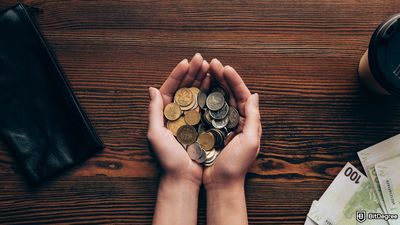Ace quick missions & earn crypto rewards while gaining real-world Web3 skills. Participate Now ! 🔥
Today, we’ll be looking at a topic that often confuses people who are new to cryptocurrency - token vs coin.
Sometimes people use the term “coin” to refer to what other people call “tokens”, and “token” to refer to what others call “coins”. Some people will use either name to refer to all the digital assets currently available.
However, there are very big differences between crypto coins and crypto tokens, so it’s important you know what they are!
This Token vs Coin guide will start by looking at why there is so much confusion over the two terms. It will then give some explanations of what coins and tokens really are, provide you with examples of coins and tokens, and explain how each is used. So, next time you go on Binance, Coinbase, Kraken, or KuCoin, and trade crypto, you'll be much better informed!
By the end of this guide, you’ll also be able to recognize whether a digital asset is a token or a coin. Which is what you’re here for right?
So, let’s get started!

Did you know?
Subscribe - We publish new crypto explainer videos every week!
Crypto Day Trading VS Swapping: What’s More Rewarding? (Animated)


Table of Contents
- 1. Token vs Coin: What is a Coin?
- 1.1. Token vs Coin: How is a Coin Used?
- 1.2. Token vs Coin: Examples of Coins
- 2. Token vs Coin: What is a Token
- 2.1. Token vs Coin: How Tokens are Created
- 2.2. Token vs Coin: Their Purpose
- 2.3. Token vs Coin: A Huge Benefit of Creating a Token
- 2.4. Token vs Coin: A Further Look into How Tokens Work
- 3. Token vs Coin: Security Token, Equity Token, or Utility Token
- 4. Token vs Coin: Conclusion
Token vs Coin: What is a Coin?
The definition of a digital coin is an asset that is native to its own blockchain. Think about Bitcoin, Litecoin, or Ether. Each of these coins exists on their own blockchain.
Latest Deal Active Right Now:For a limited time only, get Top-rated Ledger bundles for yourself and your loved ones with a 10% Ledger discount code. Take advantage of this valuable Ledger deal NOW!
So, to make this a little clearer:
- Bitcoin operates and functions on the Bitcoin blockchain
- Ether operates and functions on the Ethereum blockchain
- NEO operates and functions the NEO blockchain
Transactions of digital coins can be made from one person to another. However, no physical coins move when you send and receive them. All the “coins” exist as data on a giant global database. This database (or blockchain) keeps track of all the transactions and is checked and verified by computers around the world.
Token vs Coin: How is a Coin Used?
Digital coins are generally used in the same way as a real-life coin is – as money. You can think of coins like Bitcoin, Litecoin, and Monero just like the coins in your wallet or piggy bank. Often, they don’t serve any other purpose than to be used as money. These “cash only” coins are used:
- To transfer money (you can give and receive value using them)
- As a store of value (they can be saved and later swapped for something useful)
- As a unit of account (you can price goods or services in them)
Let’s use Bitcoin as an example to make sure you understand the above statements.
- BTC can be used to pay for goods and services all over the internet and in many real-world places too.
- You can store it for a long period of time and nothing happens to it. You can then swap it for something of equal value later.
- The things that you buy can be priced in BTC too.
Other than these monetary uses, there is no other use for Bitcoin. It can’t be staked to earn more Bitcoins and it doesn’t need to be used to operate a certain application. It is used as money and that is all.
However, some digital coins (such as Ether, NEO, and DASH) have more features than just being useful as a form of money. I’ve listed these uses below:
- Ether (ETH) is used to fuel transactions on the Ethereum network. Tokens can be built on Ethereum, but Ether is still required to send a token. It funds the mining costs (it pays the computers that verify transactions on the Ethereum network).
- NEO (NEO) is staked in a wallet to earn a dividend. This dividend is known as GAS. Tokens can be built on NEO, just like they can on Ethereum. When sending a token on the NEO network, you need to pay GAS as a transaction fee, the same way that Ether is used to pay Ethereum fees.
- Finally, holding enough Dash (DASH) allows users to vote on important decisions for the Dash network. If there is an idea suggested to upgrade the DASH network, those holding enough Dash can vote to decide whether the upgrade should happen. These voting rights allow the holders of DASH to have a say in how the project evolves.
Token vs Coin: Examples of Coins
All the largest market cap digital assets are defined as coins today. However, not all coins have a large market cap.
Of course, we’re not going to list every single digital coin here. You can see the full list over at Coinmarketcap. We have included some of the more familiar ones and their tickers though. This should help with your understanding of what we mean when we use the term ‘coin’.

Bitcoin (BTC)

Bitcoin Cash (BCH)
 Litecoin (LTC)
Litecoin (LTC)

Ethereum (ETH)

Ripple (XRP)

Cardano (ADA)

Stellar (XLM)

NEO (NEO)

NEM (XEM)

Monero (XMR)
Token vs Coin: What is a Token
Tokens often get called digital coins. However, this isn’t correct. There is a major difference!
Tokens are created on existing blockchains. In fact, thanks to the creation and facilitation of smart contracts, the most common blockchain token platform are Ethereum. Tokens that are built on the Ethereum platform are known as ERC-20 tokens.
However, there are others such as NEO, Waves, Lisk, and Stratis. While, as mentioned above, tokens on the Ethereum platform are known as ERC-20 tokens, NEO uses tokens known as NEP-5 tokens.
Anyone can make their own custom token on one of these platforms.
Token vs Coin: How Tokens are Created
It takes surprisingly little technical ability, in fact. I wouldn’t recommend it to a complete newbie, but for someone with a bit of programming experience, it wouldn’t take as long as you might think. It does need the developer to spend some of the native coins to the blockchain the token is being created on, though.
For example, if the token is being created on Ethereum, the creator will need to spend some Ether to get the network’s miners to validate the token transaction (creation).
It’s important to remember that fees need to be paid for all token transactions on a blockchain, not just the creation of the token. Therefore, any application built on Ethereum must use Ether coins to transfer the application- specific tokens from one user to another or between the app and the user.
This is the same as how coin transactions need fees to be paid to those securing the network.
Token vs Coin: Their Purpose
Most tokens exist to be used with decentralized applications, or dApps. When developers are creating their token, they can decide how many units they want to make and where these new tokens will be sent when they are created. They will pay some of the native cryptocurrency on the blockchain they are creating the token on at this point.
Once created, tokens are often used to activate features of the application they were designed for.
For example, Musicoin is a token that allows users to access different features of the Musicoin platform. This could be watching a music video or streaming a song.
Binance also has its own token. When users trade with BNB (Binance coin), their fees are 50% less.
Some tokens are created for a whole different kind of purpose: to represent a physical thing. Let’s say you wanted to sell your house using a smart contract. You can’t physically put your house into the smart contract, can you? No.
So, instead, you can use a token that represents your house.
WePower (WPR) is a good example of a token that represents a physical thing — it represents electricity. The WePower project is a dApp that allows users to buy and sell electricity on the blockchain using smart contracts. Its token (WPR) represents a certain amount of energy.


Did you know?
Subscribe - We publish new crypto explainer videos every week!
What is Algorand? ALGO Coin Explained With Animations


Token vs Coin: A Huge Benefit of Creating a Token
Since the developer of a dApp and token doesn’t have to create their own blockchain, it saves them time and resources. They can use the features of cryptocurrency with their application while benefiting from the security of the native blockchain.
Time isn’t the only thing it saves them — if they created their own blockchain and coin instead of a dApp and token, they would need to find miners to verify their transactions, too.
It takes a lot of miners to create a strong blockchain that can’t be attacked. It makes much more sense for many computers to work on one shared blockchain that several applications can run on rather than there being thousands of weak, mostly-centralized blockchains.
It’s just a much longer, much more expensive process.

- Secure and reliable
- Accepts fiat currencies
- Lots of trading options
- Reputable exchange
- Accepts fiat currencies
- Offers various trading options

- Accepts fiat currencies
- Simple to use
- Supports only trusted cryptocurrencies
- A leading cryptocurrency exchange platform
- Best for all type investors
- Accepts fiat currencies

- Beginner-friendly
- Secure
- Decent trading and withdrawal fees
Token vs Coin: A Further Look into How Tokens Work
Tokens are used to interact with decentralized applications that are built on top of different blockchains. A good example is the Civic. Civic uses a token called CVC.
Their application keeps track of encrypted identities on the Ethereum blockchain. It aims to provide a cheaper, more reliable, and more efficient way to check identities. Let’s look at how it works.
If you were going on a foreign holiday, you’d need to confirm your identity at lots of places on the way. The first might be the airline. If the airline was a partner of Civic, they’d send you a QR code to ask for information about you (the traveler).
Using the Civic app, you’d send your details directly to the company from your mobile device. The information is stored on the device but is fully encrypted. This prevents it from being stolen. A fingerprint or iris scan can prove that you’re the owner of the data received.
You can then use the same device to verify your identity at various points along the way (the airport, the hotel, etc.). Each company or organization that you use your digital identity can validate the data using the blockchain. The more times the application is used, the more trust third parties have in the digital identity stored with Civic.
The CVC token itself is used to transact in these identity-related services. It’s used to pay the verifiers of IDs (banks, governments, and other trusted sources) to do needed “know-your-customer” checks. Records of this are then stored on the blockchain/database.
Some CVC is also sent to you, the user. This is to encourage using Civic because the companies needing verification of documents will eventually need to buy more tokens from users. This creates an economy where everyone is rewarded for taking part.
As you can see, the Civic token works in a way that is more than just monetary. Also, the Civic platform would not accept BTC, ETH, or NEO to use their services — it is just the CVC token. But each transaction requires some Ether too, of course, because it is built on the Ethereum blockchain and the miners need to be paid.
Token vs Coin: Security Token, Equity Token, or Utility Token
Finally, in our token definition, let’s look at a few different types of tokens. They’re known as Security or Asset Tokens, Payment Tokens, Equity Tokens, and Utility Tokens.
In February 2018, Swiss Financial regulators FINMA published guidelines that defined what security or asset, utility, or payment tokens are. This was to help them work out how to treat different tokens when considering their legality:




When they classified the types of tokens currently available, FINMA was careful to point out that each token could fall into more than one category.
It’s likely that more financial regulators will offer slightly different definitions as space becomes more established. ICOs and tokens are very new concepts still. It’s understandable that the law hasn’t quite caught up yet.
For more on ICOs, see our "What is an ICO" guide.
Token vs Coin: Conclusion
You should now understand what is meant when someone says digital “coin” and digital “token”. It wasn’t that confusing after all, was it?
You should now know the simple definition of both a coin and a token: coins are native to their own blockchain. Whilst tokens have been built on top of another blockchain, like Ethereum, NEO, or Waves.
You should also know the most common uses for both coins and tokens. Coins are most often used simply as money; however, some coins do have other uses. These include being used to fuel applications, being used as a stake to validate a transaction on a network, or being used to fuel smart contract and token transactions.
Meanwhile, tokens serve a different purpose. If they were created to be used on a dApp, then their purpose will depend on the application itself. In some cases, they are for features such as voting rights. In other cases, they are used for transactions on the dApp (like Civic) or to reward the users with things like discounted fees, etc. (like Binance, Coinbase, or Kraken).
You’ve been given lots of examples of both coins and tokens to help you develop a clear understanding of what we mean by each term.
So, now that you know the coin definition and token definition, think about your favorite cryptos… are they coins or tokens? Ask me if you’re unsure, and I’ll confirm which they are!
The content published on this website is not aimed to give any kind of financial, investment, trading, or any other form of advice. BitDegree.org does not endorse or suggest you to buy, sell or hold any kind of cryptocurrency. Before making financial investment decisions, do consult your financial advisor.













